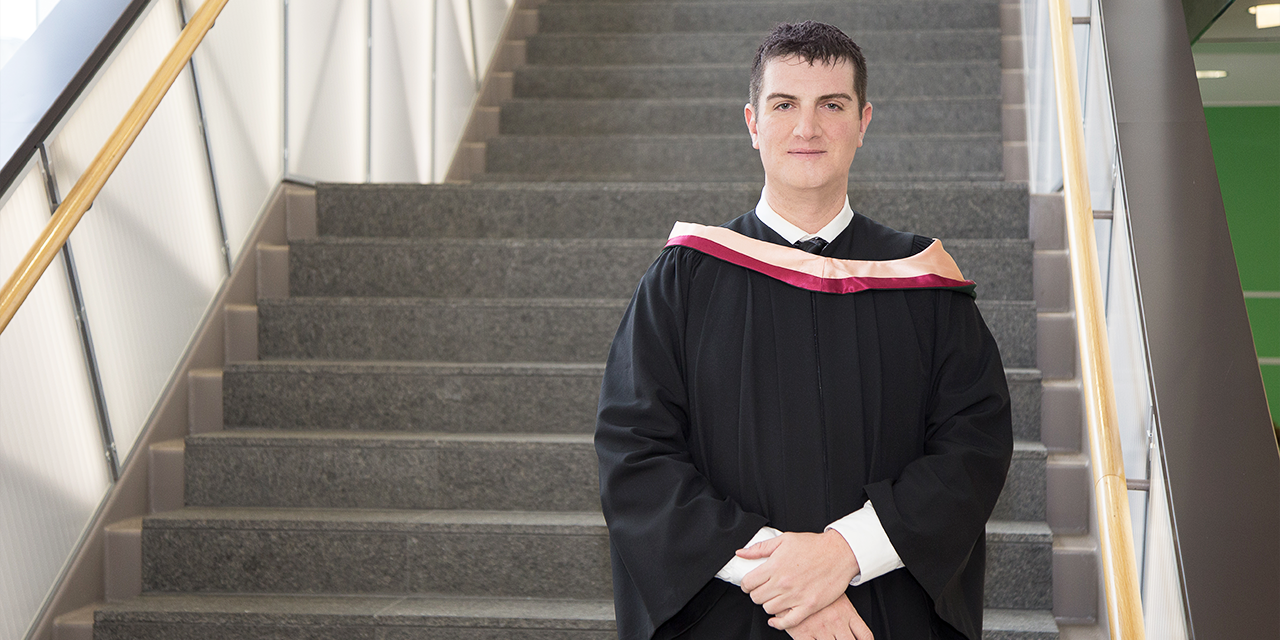
Daniel McKennitt (MPH '17)
While growing up in St. Albert, Alberta, Daniel McKennitt spent his summers in Sandy Bay First Nation in Manitoba.
It wasn't until he was an undergraduate student trying to find his path that the inequities between the two places became glaringly apparent. While they are separated by only a 12-hour drive, McKennitt realized they are worlds apart.
McKennitt, who recently graduated with a master of public health (MPH) degree in epidemiology from the School of Public Health, is a member of the Sandy Bay First Nation, located on the western shore of Lake Manitoba on Treaty 1 territory.
"There were no paved roads, we had to boil water and sometimes use outhouses, the stoves were wood-burning," explains McKennitt. "At the time, this didn't seem unusual. This was how my family and friends lived. Everyone appeared to be happy, so I thought this was ordinary."
"The majority of Canadians-even those in rural communities-have access to safe, running water, electricity, plumbing and good roads," says McKennitt. "It took me a while to clue in that these differences appeared to be unique to Indigenous communities."
While doing his undergraduate degree, McKennitt came to some other realizations. He had been studying to become a teacher, but recognized it wasn't for him. Around the same time, he made the decision to share with his family and friends that he is gay. This resulted in a lot of self-discovery and learning about the challenges facing the lesbian, gay, bisexual, transgender, two-spirited and queer (LGBTQ+) community.
"When I came out, I had people tell me that I was going to get AIDS," says McKennitt. "So I started researching the disease to understand its history and to learn where it was prevalent in the world."
Although teaching had always been his plan, he started to feel that health care was where he was meant to be. McKennitt spent a fifth year upgrading and taking more classes to be a competitive candidate for medical school.
"There was a large part of me that felt I couldn't be a gay, native physician," explains McKennitt. "But it was during my fifth year at university that things started to come together. I was becoming more comfortable with who I am-not only as a member of the LGBTQ+ community, but also as an Indigenous person. My mental outlook improved, and I started to believe I could really do this."
McKennitt graduated from the University of Alberta's Faculty of Medicine and Dentistry in 2010. He then began his residency in family medicine at the University of Alberta.
At about the same time, he met with Chris Andersen, then faculty member at University of Alberta's Faculty of Native Studies. McKennitt told Andersen his story and shared his concerns about how HIV / AIDS had spread so quickly over the last two decades. Andersen listened and then brought out a series of maps.
First, Andersen laid out a map of Canada which identified the areas with the highest incidence of HIV / AIDS. He then overlaid a map showing the areas with high Indigenous populations. Finally, he overlaid a third map indicating areas in the country with the lowest household incomes. With the maps laid one on top of each other, these areas aligned perfectly. The highest incidence of HIV / AIDS in Canada is in areas with the lowest household incomes and greatest proportion of Indigenous people.
It was an illuminating moment for McKennitt.
"It seemed to me that this disease has a brain. HIV/AIDS is choosing who to infect and where," explains McKennitt. "I was fascinated by this concept of how diseases behave, and I knew that whatever that concept was, I wanted to understand it."
McKennitt eventually learned this concept is called 'epidemiology.'
Today, McKennitt is using his medical and public health training to respond to the Truth and Reconciliation Commission's Calls to Action. He consults with Indigenous communities and government organizations in the use and power of data for decision-making. McKennitt is using his training and Indigenous ways of knowing-taught to him by Elders and knowledge keepers-to begin building relationships on a 'nation-to-nation' basis.
"This is where 'them' and 'us' changes to 'we,'" says McKennitt. "This shift opens the door for real change, and ultimately will improve the health of Indigenous people."